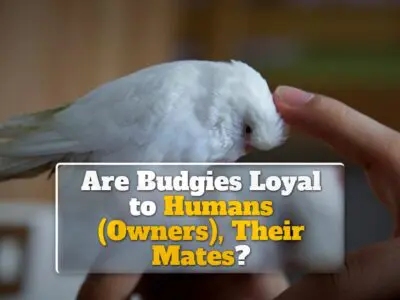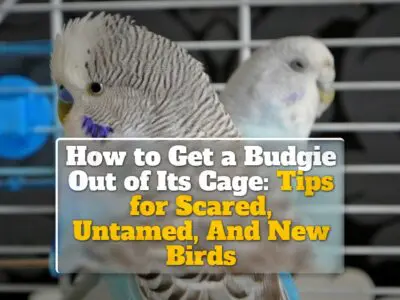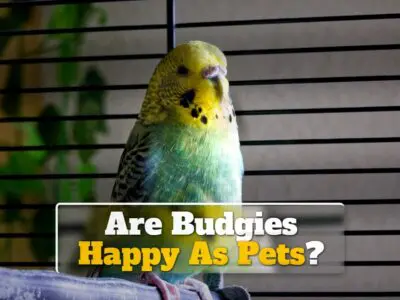Budgies can indeed miss their owners.
These intelligent birds build deep bonds with their caregivers, recognizing their voices and appearances.
In their owner’s absence, budgies may show signs of missing them, including increased activity, vocalizations, and contact-seeking behaviors.
If there’s one thing I’ve learned from my years of interacting with birds, especially my sweet budgies, it’s that they are much more emotionally complex than people often give them credit for.
Do budgies miss their owners? Oh, they certainly do, and I’m thrilled to share with you how and why that happens, based on my experiences and knowledge.
Why Do Budgies Miss Their Owners?
Before we delve into the signs of budgies missing their owners, let’s understand the ‘why’ behind it.
Budgies, like their wild counterparts, are social creatures by nature.
In the wild, they live in large flocks, often comprising thousands of birds.
The flock provides them with companionship, protection, and opportunities for social interaction.
It’s a place where they can learn, communicate, and share resources.
When a budgie becomes a pet, its human caregiver essentially becomes a part of its flock.
The budgie forms a bond with its owner, relying on them for food, care, social interaction, and stimulation.
This close association makes the owner a significant part of the budgie’s life.
Therefore, when the owner is absent, the budgie perceives it as losing a vital part of its social circle, which can trigger feelings of loneliness or sadness.
This is why budgies may miss their owners.
The emotional depth of budgies should not be underestimated.
Despite their small size, these birds have an impressive capacity for emotion.
Research has shown that birds, including budgies, experience complex emotions much like humans do.
They can feel joy, sadness, love, fear, and yes – even a sense of missing someone important to them.
Moreover, budgies are intelligent creatures.
They have a good memory and can recognize their owners, associating them with positive experiences such as feeding, playtime, or cuddles.
When you’re not around, your budgie may long for these positive interactions, leading to feelings of missing you.
It’s worth mentioning here that each budgie is an individual with its unique personality and ways of expressing emotions.
Some budgies may show more apparent signs of missing their owners, while others may be more subtle in their expressions.
In the next sections, we’ll look at some common signs that your budgie may be missing you.
It’s always a good idea to pay close attention to your budgie’s behavior.
Understanding these signs can help you provide the best care for your feathered friend, ensuring their happiness and wellbeing.
How Do I Know And Be Sure That My Budgie Will Miss Me? Affection Signs
How do you know for sure that your budgie misses you? There are several affection signs that budgies use to communicate their emotions, including missing their owners.
As we explore these signs, remember that every budgie is unique, and may not express their feelings in the exact same way as another.
By carefully observing your budgie, you can learn to recognize their specific behaviors and what they mean.
Vocalizations
Budgies are known for their vocalizations.
They use different sounds, chirps, and songs to communicate a range of messages.
You may notice that your budgie becomes particularly vocal when you enter the room or when they hear your voice.
This could be a sign that they recognize your presence and are expressing their happiness and excitement to see you.
If they miss you when you’re gone, they might express this through increased vocalization when you return.
Responding To Your Speech, Sing With You
One endearing behavior that budgies may exhibit when they miss their owners is responding to your speech or singing along with you.
Budgies are among the bird species that can mimic human speech and sounds, indicating their strong bonds with their human caregivers.
If your budgie starts to mimic your words or sings along when you’re playing music or singing, this is a sign that they are interacting with you and consider you a part of their flock.
It’s also a sign that they miss these interactions when you’re not around.
Wing Flapping And Head Bobbing
Wing flapping and head bobbing are common behaviors in budgies that express excitement and anticipation.
These behaviors can also be signs that your budgie misses you.
If they engage in rapid wing flapping or head bobbing when they see you, it could be a sign that they are excited and happy to see you again.
This burst of energy and enthusiasm can be interpreted as a form of greeting and celebration of your return.
Flying To You, Following You, And Sitting On Your Shoulders
A very clear sign of a budgie’s attachment to its owner is if they fly towards you when you approach their cage or enter the room.
This behavior demonstrates that they feel comfortable and safe in your presence and are eager to interact with you.
Following you around the room or moving towards your side of the cage can be another telltale sign of your budgie’s attachment.
This behavior demonstrates that your budgie is comfortable with you and enjoys your company.
The act of sitting on your shoulders can be another sign that your budgie has formed a deep bond with you.
This action can be seen as an indication of trust and affection, as birds will only sit on someone’s shoulder if they feel comfortable and secure.
If your budgie regularly seeks out your shoulder to sit on, it’s likely that they see you as a trusted member of their flock and will miss your presence when you’re not there.
Preening Behavior
The preening behavior of budgies is an essential part of their grooming.
Budgies use preening to clean their feathers, keep them in top condition, and soothe themselves.
However, if you notice your budgie preening more intensively when you’re around, it might indicate their happiness and contentment in your presence.
They may feel safer or more secure when you are nearby, allowing them to engage in this vulnerable activity more readily.
Regurgitation
This might sound a little strange, but regurgitation in budgies can actually be a sign of affection.
Regurgitation is a behavior where budgies bring up food from their crop (a kind of bird’s food storage sac) to their mouth.
This is often a courtship behavior, as budgies share food with their mate to strengthen their bond.
If your budgie regurgitates food when you’re near, it could mean they see you as a trusted companion and are trying to share their ‘meal’ with you.
It’s their way of expressing love and closeness, which also suggests they miss you when you’re not around.
Increased Activity
If you notice your budgie displaying an increased level of activity when you’re present, such as flying more vigorously, hopping around, or playing with their toys more than usual, it could mean they are happy to see you.
These activities suggest that your presence stimulates them and elicits a more playful and energetic demeanor, which could translate to your budgie missing you when you’re not around.
Contact-Seeking Behaviors
Your budgie may show contact-seeking behaviors to indicate that they miss you.
For instance, they may tap or peck at the cage bars near where you usually sit, stretch out towards you when you pass by, or even try to ‘kiss’ you by touching their beak to your hand or face.
These behaviors suggest your budgie is trying to interact with you, expressing their affection and desire to be close to you.
How Many Hours Or Days Will My Budgie Start Missing For Me If It Does Not See Me?
Exact timelines for when a budgie will start missing its owner vary significantly from bird to bird and depend on factors such as their level of attachment and the degree of routine established in their care.
However, budgies are highly social creatures and are accustomed to constant companionship in their natural habitats.
It’s possible that a budgie could start feeling the absence of its owner after just a few hours.
Longer absences, like a day or more, could potentially lead to signs of stress or loneliness in your budgie.
Do Budgies Miss More Than One Person At The Same Time?
Indeed, budgies can form attachments to more than one person.
If your budgie is used to interacting with multiple people in your household, it’s plausible that they could miss more than one person at the same time.
Their bond isn’t exclusive to one person, especially if they have been socialized with many people consistently.
You might notice your budgie exhibiting signs of missing its human friends if one or more people they’re bonded with are absent.
Do Budgies Miss Other Pets In The House?
Budgies are capable of forming connections with other pets in the house, but this depends on the relationship they’ve built with those pets.
If a budgie is used to socializing with a cat, dog, or even a hamster, and they’ve had positive experiences with them, they might show signs of missing these other pets.
They might search for them or call out for them when they’re not present.
However, always supervise interactions between budgies and other pets for safety reasons.
Do Budgies Miss Other Birds?
Yes, budgies definitely miss other birds, particularly other budgies.
In the wild, budgies live in large flocks and are seldom alone.
So, in a home setting, a budgie can indeed miss the company of other birds if they were used to interacting with them.
If a companion bird is removed or passes away, the remaining budgie might show signs of grief or loneliness.
How Long Can Budgies Miss Their Owners? +STUDY
The length of time a budgie can miss its owner can stretch over a prolonged period, depending on their bond and the extent of the owner’s absence.
Budgies can remember their owners for weeks, months, and possibly even years.
A budgie might continue to show signs of missing its owner until they return, or until the budgie adjusts to their absence.
According to the study, female budgerigars were able to retain the auditory memory of their mate’s call for at least one month after separation.
During this period, the females continued to show a preference for their respective mates’ calls.
However, after six months of separation, the preference response of the females for their mates’ calls ceased, indicating that the memory of the mate’s call eventually extinguished.
Therefore, based on the findings of this study, we can assume that at least female budgies will miss and continue to seek them out their mates or human owners for up to a few months.
FAQs
In this section, we’ll address some of the frequently asked questions regarding budgies and their interactions with their owners.
Do Budgies Miss Their Previous Owners?
If a budgie has formed a strong bond with a previous owner, it’s quite possible that they may miss them when rehomed.
Budgies can remember people they’ve bonded with for a long time and may show signs of confusion or stress in a new environment or with new people.
It’s crucial to offer plenty of patience, gentleness, and consistent positive interactions when introducing a budgie to a new home or owner, as they may need time to adjust and form new bonds.
How Can I Comfort My Budgie When I’m Not Home?
When you’re not home, your budgie might feel lonely or miss your company.
To comfort your budgie, you can leave soft, soothing music playing or bird song recordings.
This can simulate the company and sounds of a flock, helping them feel more secure.
Also, provide plenty of toys for mental stimulation and distraction.
Is It OK to Leave Budgies Alone During the Day?
Budgies are social animals and can get lonely if left alone for too long.
If you work all day, it’s a good idea to get a second budgie as a companion.
Alternatively, keep them in a busy area of the house, like the living room, so they feel part of the family’s daily activities.



